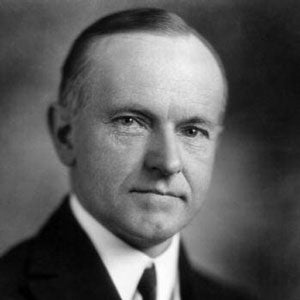Calvin Coolidge
30th president - 1923-1929

The son of a Vermont storekeeper, Coolidge had worked his way up the political ladder from councilman in Northampton to governor of Massachusetts and, later, Vice-President to Warren Harding. As president, he saw himself as a champion of traditional values in a booming economy. He called to Congress for isolation in foreign policy, and for tax cuts and limited aid to farmers.
The public liked it. In the 1924 election, as the beneficiary of what was becoming known as "Coolidge prosperity", he polled more than 54 per cent of the popular vote. He used his inaugural address to assert that the country had achieved "a state of contentment seldom before seen" and pledged himself to maintain the status quo. In subsequent years he twice vetoed farm relief bills, and killed a plan to produce cheap Federal electric power on the Tennessee River.
Apart from that, he did little, and believed that the surging stock market vindicated his minimalist approach. He showed as little concern for the idea that the boom might be unsustainable as he did for the fact that, during his presidency, membership of the Ku Klux Klan exceeded 4 million. Instead, he developed, and encouraged a reputation for being a man of few words. Commentators approved. "This active inactivity suits the mood and certain of the needs of the country admirably," wrote Walter Lippmann in 1926. No one imagined the economic catastrophe that lay ahead.
In 1927, Coolidge handed reporters a slip of paper on which he had written: "I do not choose to run for President in 1928." He devoted much of his retirement to writing, and died at home in January 1933. When Dorothy Parker was told he was dead, she said: "How could they tell?"
In his own words
"The chief business of America is business."
"Four-fifths of all our troubles in this life would disappear if we would only sit down and keep still."
"When a great many people are unable to find work, unemployment results."
In others' words
"Nero fiddled while Rome burned, but Coolidge only snores." H L Mencken
Minutiae
One of his sons died, aged 16, from playing tennis wearing trainers, but no socks. He developed a blister, which became fatally infected.
He would sleep for 11 hours a day.
When a guest at a dinner said: "You must talk to me, Mr President. I made a bet that I could get more than two words out of you." He replied simply: "You lose."
He had a pet raccoon called Rebecca, which was a gift from Peru. It was meant to be a culinary treat.
He insisted on wearing baggy underwear.
His wife did not know that he had decided not to seek re-election in 1928 until he announced it to the press.
When President Harding died, Coolidge was staying on his father's farm in Vermont. There was no telephone, or electricity, so the news reached him by messenger in the middle of the night. He was woken; swore the oath of office, by the light of a kerosene lamp, at 2.47am; and then went back to sleep.
Groucho Marx once noticed Coolidge in the audience for a Marx Brothers show and shouted out: "Isn't it past your bedtime, Calvin?"
"Don't hurry to legislate. Give administration a chance to catch up with legislation."
"The words of a President have an enormous weight," he would later write, "and ought not to be used indiscriminately."
"He is very self-contained, very simple, very direct and very shrewd in his observations." William Howard Taft
"A shining public example of the simple and homely virtues which came down to him from his New England ancestors." Alfred E Smith
"The only man, woman or child who wrote a simple declarative sentence with seven grammatical errors." e e cummings
Join our commenting forum
Join thought-provoking conversations, follow other Independent readers and see their replies
Comments
Bookmark popover
Removed from bookmarks